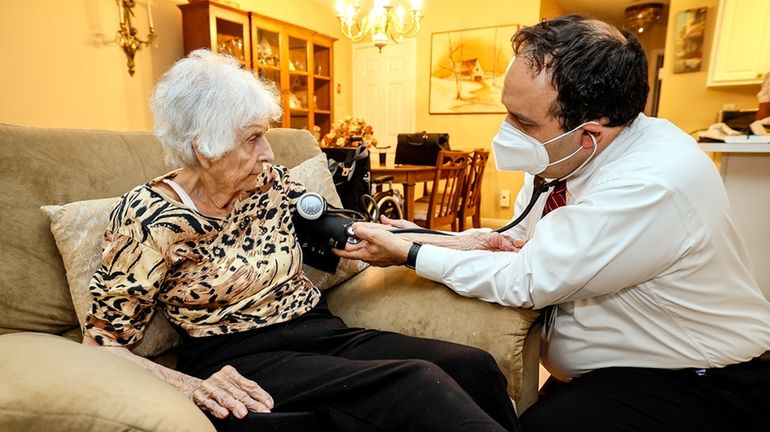Medicare rewards Northwell for top at-home care program

Ann D'Andrea gets a checkup in her Bethpage home from Dr. Konstantinos Deligiannidis, medical director of Northwell Health's House Calls program. Credit: Northwell Health/Lee S. Weissman
Maria Tuttle used to have to help her ailing, elderly mother into a wheelchair and drive her to each medical appointment and hospital visit. Now, though, 95-year-old Ann D’Andrea gets medical care — from routine checkups to X-rays — in her Bethpage home, in a pioneering program funded by Medicare.
D’Andrea is one of about 600 patients taking part in a Northwell Health program that offers at-home care to chronically ill adults who receive health insurance through Medicare, the federal system that covers 62.7 million Americans, mostly seniors.
Medicare funds the at-home services through Independence at Home, a program that aims to “improve the overall quality of care and quality of life for patients served, while lowering health care expenditures by avoiding costly hospital care and forestalling the need for care in institutional settings,” according to the federal agency that runs Medicare.
Independence at Home paid Northwell $6.54 million to reward it for cost savings and performance on quality measures in 2020, making it the top-performing practice of the 10 participants in the national program, the most recent Medicare report on the effort shows.
The program helps make it financially sustainable to offer at-home care to chronically ill patients, said Dr. Zenobia Brown, senior vice president and associate chief medical officer at Northwell Health.
“It costs a lot more for a doctor to go to your home than to sit in an office,” where a physician could see as many as 30 patients a day, Brown said. But, she said, at-home care “is still much cheaper than an ICU stay.” Northwell's House Call program serves about 1,200 patients a year, including those receiving treatment through a separate Medicare program called Hospital at Home. That program serves patients who need hospital-level care.
In addition to Northwell, Rockville Centre-based Catholic Health and other health systems also provide home-care services to Long Islanders, funded by Medicare, Medicaid, private health insurance and other sources.
Medicare’s Independence at Home is underway at 10 practices across the country, including New York City-based Comprehensive Geriatric Medicine P.C., also known as Doctors on Call, which received $2.58 million in incentive payments for 2020, Medicare reported. The other eight participants are based outside of New York.
To be eligible for Independence at Home, patients must be adults who receive Medicare, have at least two chronic conditions, need help with at least two activities such as walking or eating and have had a recent hospital admission, among other criteria. Northwell aims to double the number of participants in the coming years, Brown said.
Without the Independence at Home services, Tuttle said, her mother “would be in and out of the hospital,” getting disoriented by the change in her environment. The 95-year-old suffers from a condition that causes fainting, and she also has dementia, arthritis and other health problems, Tuttle said.
Compared with a hospital visit, Tuttle said, “I think she's getting such better care at home.” Her mother has received EKG heart rhythm checkups — read remotely by her doctor — as well as X-rays, vaccinations and in-person visits from medical providers, Tuttle said.
In the Independence at Home program, Medicare estimates how much it would spend on a typical patient who qualifies for the program but receives care in doctors’ offices and hospitals. The 10 participating practices send doctors, nurses, social workers and paramedics to patients’ homes. Then, Medicare compares what it would have paid without the program with the actual costs.
The federal program makes “incentive” payments based on how much the practices saved by avoiding institutional care, as well as their performance on six measures of quality care, such as avoiding emergency room visits and hospital admissions, and contacting patients shortly after each hospital stay to check on their medications and overall health.
On average, the 10 participating practices reduced costs by 18% in 2020, or about $6,585 per patient, Medicare reported. Northwell reduced costs by $22,380 per patient, the federal system reported.
There are no restrictions on services, and patients can still get all the care they need, Brown said.
The program, said Dr. Konstantinos Deligiannidis, medical director of Northwell's House Calls program, “is about providing comprehensive care to these vulnerable patients, and reducing suffering.”

